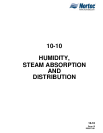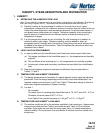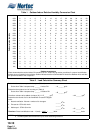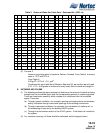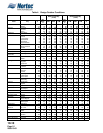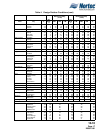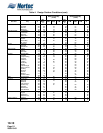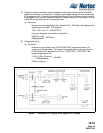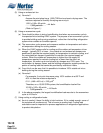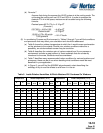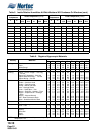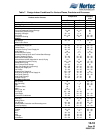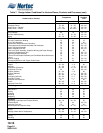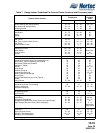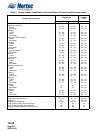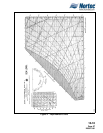
10-10
Page 20
2008-10-01
(5) Using an exhaust air fan:
(a) Formula 5
Assume the print shop has a 1,000 CFM fan to exhaust a drying room. The
moisture required to humidify the drying room only is
1,000 x 5.08 x 60 min/hr
_________________________
= 44 lbs/hr
7,000 grains/lb
(Refer to Figure 1.)
(6) Using an economizer cycle:
(a) Care should be taken in sizing humidification load when an economizer cycle is
incorporated into a building HVAC system. The purpose of an economizer cycle is
to provide building cooling using outside air, rather then the building refrigeration
system when outside air conditions permit.
(b) The economizer cycle senses and compares outdoor air temperature and return
air temperature during the cooling season.
(c) When the HVAC system calls for cooling and the outdoor air temperature is low
enough – typically 55°F or lower – the outside air and exhaust air dampers are
positioned to provide the required supply air temperature to maintain cooling, and
the recirculated air damper is positioned to maintain the required supply air
volume. When the outdoor air temperature is higher than the supply air
temperature required to maintain cooling but is lower than the return air
temperature, the make-up air and exhaust air dampers are 100% open. The
recirculation air damper closes, and the building refrigeration system provides the
portion of cooling load that cannot be provided by outside air intake.
(d) From this it can be seen that it is possible to introduce 100% outside air into a
building during the cooling season.
(e) Formula 6
For example, if out print shop were using 100% outdoor air at 55°F and
40% rh, then the moisture required is
5.19 - (4.89 x 40% rh) = 3.23 gr/ft
3
Therefore, on a 15,000 CFM system, the humidification load will be
15,000 x 3.23 x 60 min/hr
__________________________
= 415 lbs/hr
7,000 grains/lb
(f) In the above examples, the largest humidification load was due to the economizer
cycle at 415 lbs/hr.
(7) Using cooling or refrigeration loads:
(a) As air is cooled, it loses it’s ability to hold moisture. If it is cooled enough, some of
the moisture will condense out. This is known as cooling load. Cooling load
calculations can be important for process applications or refrigeration applications
to product dehydration.



